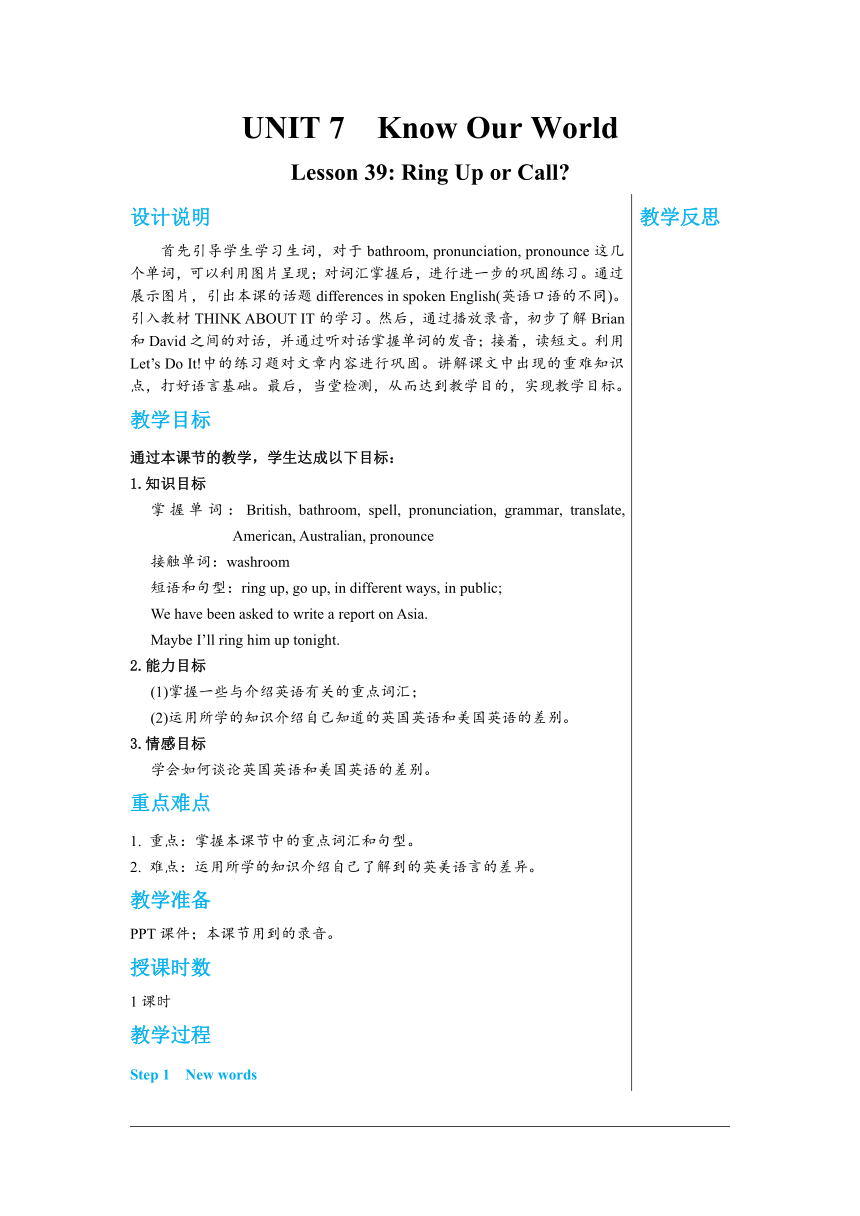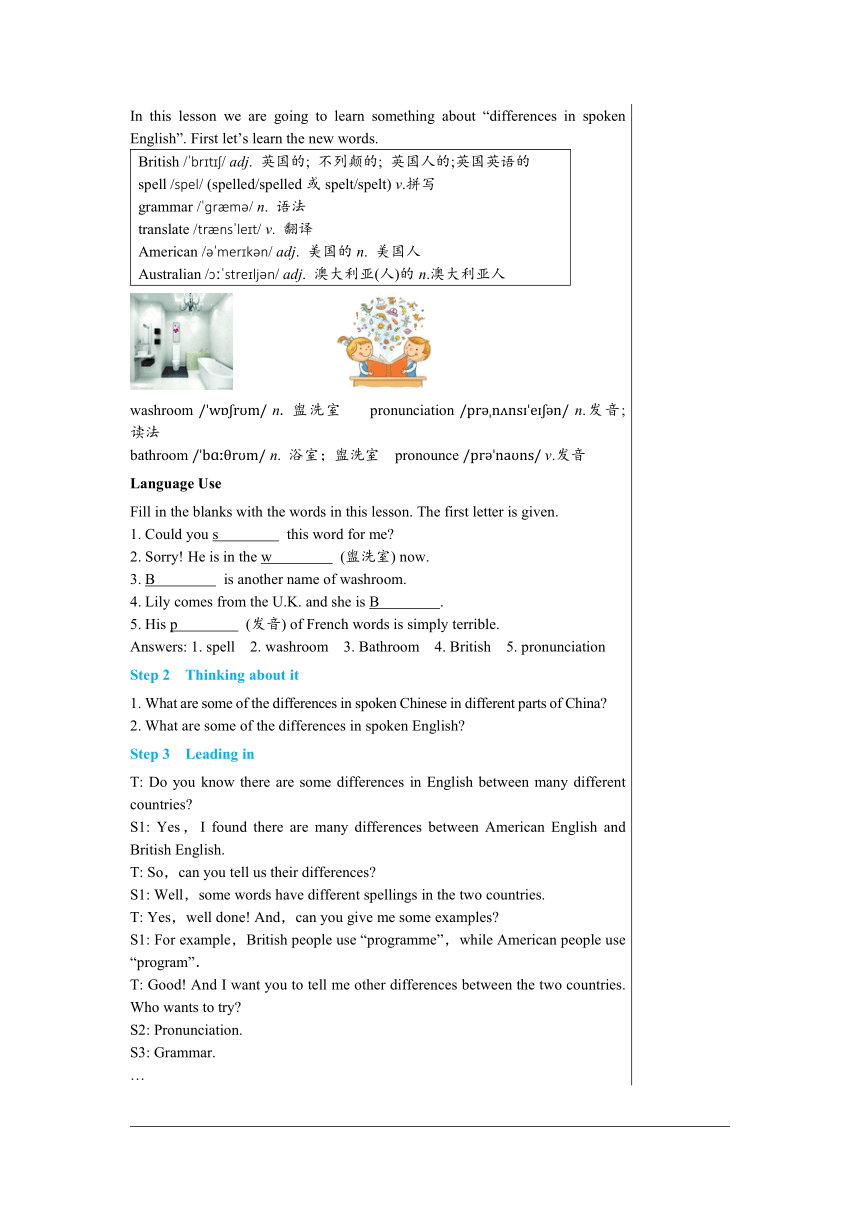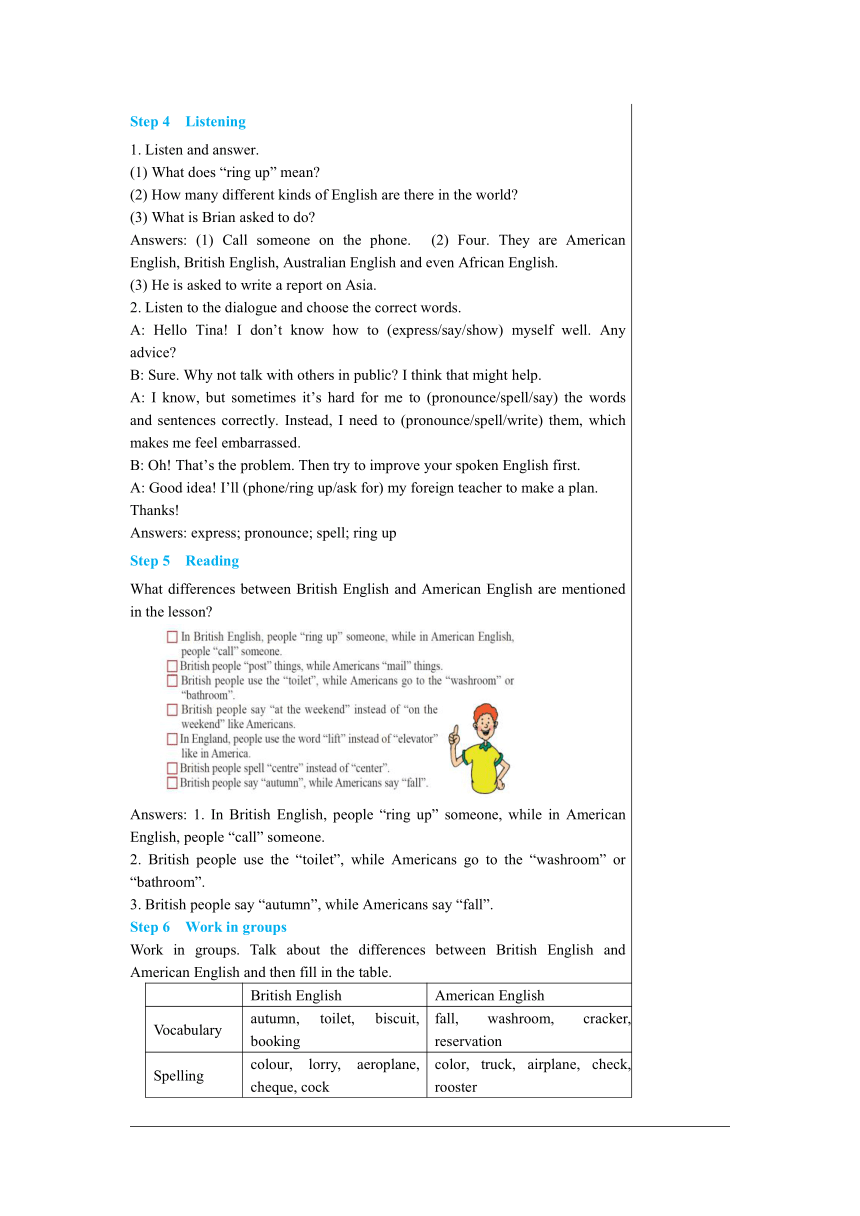UNIT 7 Lesson 39教学详案—冀教版中学英语八年级下
文档属性
| 名称 | UNIT 7 Lesson 39教学详案—冀教版中学英语八年级下 |

|
|
| 格式 | docx | ||
| 文件大小 | 200.1KB | ||
| 资源类型 | 试卷 | ||
| 版本资源 | 冀教版 | ||
| 科目 | 英语 | ||
| 更新时间 | 2024-02-21 20:15:03 | ||
图片预览



文档简介
UNIT 7 Know Our World
Lesson 39: Ring Up or Call
设计说明 首先引导学生学习生词,对于bathroom, pronunciation, pronounce这几个单词,可以利用图片呈现;对词汇掌握后,进行进一步的巩固练习。通过展示图片,引出本课的话题differences in spoken English(英语口语的不同)。引入教材THINK ABOUT IT的学习。然后,通过播放录音,初步了解Brian和David之间的对话,并通过听对话掌握单词的发音;接着,读短文。利用Let’s Do It!中的练习题对文章内容进行巩固。讲解课文中出现的重难知识点,打好语言基础。最后,当堂检测,从而达到教学目的,实现教学目标。 教学目标 通过本课节的教学,学生达成以下目标: 1.知识目标 掌握单词:British, bathroom, spell, pronunciation, grammar, translate, American, Australian, pronounce 接触单词:washroom 短语和句型:ring up, go up, in different ways, in public; We have been asked to write a report on Asia. Maybe I’ll ring him up tonight. 2.能力目标 (1)掌握一些与介绍英语有关的重点词汇; (2)运用所学的知识介绍自己知道的英国英语和美国英语的差别。 3.情感目标 学会如何谈论英国英语和美国英语的差别。 重点难点 1. 重点:掌握本课节中的重点词汇和句型。 2. 难点:运用所学的知识介绍自己了解到的英美语言的差异。 教学准备 PPT课件;本课节用到的录音。 授课时数 1课时 教学过程 Step 1 New words In this lesson we are going to learn something about “differences in spoken English”. First let’s learn the new words. British / br t / adj. 英国的; 不列颠的; 英国人的;英国英语的 spell /spel/ (spelled/spelled或spelt/spelt) v.拼写 grammar / ɡr m / n. 语法 translate /tr ns le t/ v. 翻译 American / mer k n/ adj. 美国的n. 美国人 Australian / stre lj n/ adj. 澳大利亚(人)的n.澳大利亚人
washroom / w r m/ n. 盥洗室 pronunciation /pr n ns e n/ n.发音; 读法 bathroom / bɑ θr m/ n. 浴室;盥洗室 pronounce /pr na ns/ v.发音 Language Use Fill in the blanks with the words in this lesson. The first letter is given. 1. Could you s this word for me 2. Sorry! He is in the w (盥洗室) now. 3. B is another name of washroom. 4. Lily comes from the U.K. and she is B . 5. His p (发音) of French words is simply terrible. Answers: 1. spell 2. washroom 3. Bathroom 4. British 5. pronunciation Step 2 Thinking about it 1. What are some of the differences in spoken Chinese in different parts of China 2. What are some of the differences in spoken English Step 3 Leading in T: Do you know there are some differences in English between many different countries S1: Yes,I found there are many differences between American English and British English. T: So,can you tell us their differences S1: Well,some words have different spellings in the two countries. T: Yes,well done! And,can you give me some examples S1: For example,British people use “programme”,while American people use “program”. T: Good! And I want you to tell me other differences between the two countries. Who wants to try S2: Pronunciation. S3: Grammar. … Step 4 Listening 1. Listen and answer. (1) What does “ring up” mean (2) How many different kinds of English are there in the world (3) What is Brian asked to do Answers: (1) Call someone on the phone. (2) Four. They are American English, British English, Australian English and even African English. (3) He is asked to write a report on Asia. 2. Listen to the dialogue and choose the correct words. A: Hello Tina! I don’t know how to (express/say/show) myself well. Any advice B: Sure. Why not talk with others in public I think that might help. A: I know, but sometimes it’s hard for me to (pronounce/spell/say) the words and sentences correctly. Instead, I need to (pronounce/spell/write) them, which makes me feel embarrassed. B: Oh! That’s the problem. Then try to improve your spoken English first. A: Good idea! I’ll (phone/ring up/ask for) my foreign teacher to make a plan. Thanks! Answers: express; pronounce; spell; ring up Step 5 Reading What differences between British English and American English are mentioned in the lesson Answers: 1. In British English, people “ring up” someone, while in American English, people “call” someone. 2. British people use the “toilet”, while Americans go to the “washroom” or “bathroom”. 3. British people say “autumn”, while Americans say “fall”. Step 6 Work in groups Work in groups. Talk about the differences between British English and American English and then fill in the table. British EnglishAmerican EnglishVocabularyautumn, toilet, biscuit, bookingfall, washroom, cracker, reservationSpellingcolour, lorry, aeroplane, cheque, cockcolor, truck, airplane, check, roosterExpressionring up someone, angry withcall someone on the phone, angry atOther differences
Step 7 Practice Read the dialogue, then act out the dialogue with your partner. Step 8 Language points 1. We have been asked to write a report on Asia. 我们被要求写一篇关于亚洲的报告。 辨析: on与about on与about都可作介词,意为“关于,有关”,一般情况下两者可互换,但它们也有区别。 ①on多用于系统论述或专题演讲、论著等。 He will give us a talk on the history of the Party. 他将给我们作一个关于党史的报告。 ②about常用于简单的、浅显的论述或讲解等,是一般用语,多用于讲故事、交谈等。 The teacher told us a story about the bird. 老师给我们讲了一个关于这只鸟儿的故事。 2. Maybe I’ll ring him up tonight. 或许今晚我将给他打电话。 ring up是“动词+副词”型短语,意为“给……打电话”。若宾语为代词,必须放在二者之间;若宾语为名词,放在ring和up之间或者up之后均可。 They often ring up their parents. 他们经常给父母打电话。 3. Phones don’t go up when they ring. 当电话响铃时它们不会上升。 go up 意为“上升;提高;增长”。 The price of the tomatoes has gone up. 西红柿的价格已经上涨了。 4. “To ring up someone” is the British way of saying to call someone on the phone. “To ring up someone”是“给某人打电话”的英式说法。 (1)该句中包含了两个动词不定式短语: “To ring up someone” 在句中作主语。当单个的动词不定式(短语)作主语时,其后的谓语动词用单数形式;“to call someone on the phone” 在此处作say的宾语。 To get up early in the morning is difficult for me. 早上早起对我来说很困难。(动词不定式短语作主语) I hope to be a doctor in the future. 我希望将来能成为一名医生。(动词不定式短语作宾语) (2) on the phone 通电话 Mike is calling on the phone. 迈克正在打电话。 5. There are quite a few differences between your English and my English. 你的英语和我的英语有相当多的不同。 quite a few 意为“相当多”, 后面接可数名词复数,相当于many。 I have quite a few friends. 我有相当多的朋友。 【拓展】 quite a little意为“相当多”,相当于much,后面接不可数名词。 There is quite a little juice in the bottle. 瓶子里有相当多的果汁。 6. Sometimes we describe the same thing in different ways or use different words.有时我们用不同的方式或不同的单词来描述相同的事情。 in different ways 用不同的方式或方法 People all over the world celebrate New Year in different ways. 世界各地的人们以不同的方式庆祝新年。 different adj. 不同的。常用短语: be different from与……不同 My answer is different from yours. 我的答案和你的不同。 7. We say “in a team”, while you say “on a team”. 我们说“in a team”,而你们说“on a team”。 该句是由两个简单句构成的,前后分句由并列连词while连接。 while 在此意为 “而,然而”,表示对比关系。 You go westward while I go eastward. 你朝西走,而我往东走。 8. Why not talk with others in public 为什么不在公众场合和别人交谈呢? in public 公开地,当众。其反义短语为 in private(私下地)。 Don’t be shy in public. 在公众场合不要害羞。 Step 9 Summary 1. Learn some new words and expressions. 2. Get to know the different English expressions in different countries. Step 10 Homework 1. Recite the words and phrases in this lesson. 2. Search and learn the different English expressions in different countries online. 3. Preview next lesson. 当堂达标 用括号内所给词的适当形式填空 1. There are many (different) between the twin brothers. 2. “BFN” (mean) “Bye for now”. 3. Why not (stand) here 4. The question is very difficult. I would like (ask) my teacher. 5. “Soccer” is another way of (say)“football”. 答案: 1. differences 2. means 3. stand 4. to ask 5. saying 板书设计 UNIT 7 Know Our World Lesson 39: Ring Up or Call spell, pronunciation, grammar, translate ring up, go up, in different ways, in public1. Maybe I’ll ring him up tonight. 2. Phones don’t go up when they ring. 3. Sometimes we describe the same thing in different ways or use different words. 4. Why not talk with others in public
教学反思
Lesson 39: Ring Up or Call
设计说明 首先引导学生学习生词,对于bathroom, pronunciation, pronounce这几个单词,可以利用图片呈现;对词汇掌握后,进行进一步的巩固练习。通过展示图片,引出本课的话题differences in spoken English(英语口语的不同)。引入教材THINK ABOUT IT的学习。然后,通过播放录音,初步了解Brian和David之间的对话,并通过听对话掌握单词的发音;接着,读短文。利用Let’s Do It!中的练习题对文章内容进行巩固。讲解课文中出现的重难知识点,打好语言基础。最后,当堂检测,从而达到教学目的,实现教学目标。 教学目标 通过本课节的教学,学生达成以下目标: 1.知识目标 掌握单词:British, bathroom, spell, pronunciation, grammar, translate, American, Australian, pronounce 接触单词:washroom 短语和句型:ring up, go up, in different ways, in public; We have been asked to write a report on Asia. Maybe I’ll ring him up tonight. 2.能力目标 (1)掌握一些与介绍英语有关的重点词汇; (2)运用所学的知识介绍自己知道的英国英语和美国英语的差别。 3.情感目标 学会如何谈论英国英语和美国英语的差别。 重点难点 1. 重点:掌握本课节中的重点词汇和句型。 2. 难点:运用所学的知识介绍自己了解到的英美语言的差异。 教学准备 PPT课件;本课节用到的录音。 授课时数 1课时 教学过程 Step 1 New words In this lesson we are going to learn something about “differences in spoken English”. First let’s learn the new words. British / br t / adj. 英国的; 不列颠的; 英国人的;英国英语的 spell /spel/ (spelled/spelled或spelt/spelt) v.拼写 grammar / ɡr m / n. 语法 translate /tr ns le t/ v. 翻译 American / mer k n/ adj. 美国的n. 美国人 Australian / stre lj n/ adj. 澳大利亚(人)的n.澳大利亚人
washroom / w r m/ n. 盥洗室 pronunciation /pr n ns e n/ n.发音; 读法 bathroom / bɑ θr m/ n. 浴室;盥洗室 pronounce /pr na ns/ v.发音 Language Use Fill in the blanks with the words in this lesson. The first letter is given. 1. Could you s this word for me 2. Sorry! He is in the w (盥洗室) now. 3. B is another name of washroom. 4. Lily comes from the U.K. and she is B . 5. His p (发音) of French words is simply terrible. Answers: 1. spell 2. washroom 3. Bathroom 4. British 5. pronunciation Step 2 Thinking about it 1. What are some of the differences in spoken Chinese in different parts of China 2. What are some of the differences in spoken English Step 3 Leading in T: Do you know there are some differences in English between many different countries S1: Yes,I found there are many differences between American English and British English. T: So,can you tell us their differences S1: Well,some words have different spellings in the two countries. T: Yes,well done! And,can you give me some examples S1: For example,British people use “programme”,while American people use “program”. T: Good! And I want you to tell me other differences between the two countries. Who wants to try S2: Pronunciation. S3: Grammar. … Step 4 Listening 1. Listen and answer. (1) What does “ring up” mean (2) How many different kinds of English are there in the world (3) What is Brian asked to do Answers: (1) Call someone on the phone. (2) Four. They are American English, British English, Australian English and even African English. (3) He is asked to write a report on Asia. 2. Listen to the dialogue and choose the correct words. A: Hello Tina! I don’t know how to (express/say/show) myself well. Any advice B: Sure. Why not talk with others in public I think that might help. A: I know, but sometimes it’s hard for me to (pronounce/spell/say) the words and sentences correctly. Instead, I need to (pronounce/spell/write) them, which makes me feel embarrassed. B: Oh! That’s the problem. Then try to improve your spoken English first. A: Good idea! I’ll (phone/ring up/ask for) my foreign teacher to make a plan. Thanks! Answers: express; pronounce; spell; ring up Step 5 Reading What differences between British English and American English are mentioned in the lesson Answers: 1. In British English, people “ring up” someone, while in American English, people “call” someone. 2. British people use the “toilet”, while Americans go to the “washroom” or “bathroom”. 3. British people say “autumn”, while Americans say “fall”. Step 6 Work in groups Work in groups. Talk about the differences between British English and American English and then fill in the table. British EnglishAmerican EnglishVocabularyautumn, toilet, biscuit, bookingfall, washroom, cracker, reservationSpellingcolour, lorry, aeroplane, cheque, cockcolor, truck, airplane, check, roosterExpressionring up someone, angry withcall someone on the phone, angry atOther differences
Step 7 Practice Read the dialogue, then act out the dialogue with your partner. Step 8 Language points 1. We have been asked to write a report on Asia. 我们被要求写一篇关于亚洲的报告。 辨析: on与about on与about都可作介词,意为“关于,有关”,一般情况下两者可互换,但它们也有区别。 ①on多用于系统论述或专题演讲、论著等。 He will give us a talk on the history of the Party. 他将给我们作一个关于党史的报告。 ②about常用于简单的、浅显的论述或讲解等,是一般用语,多用于讲故事、交谈等。 The teacher told us a story about the bird. 老师给我们讲了一个关于这只鸟儿的故事。 2. Maybe I’ll ring him up tonight. 或许今晚我将给他打电话。 ring up是“动词+副词”型短语,意为“给……打电话”。若宾语为代词,必须放在二者之间;若宾语为名词,放在ring和up之间或者up之后均可。 They often ring up their parents. 他们经常给父母打电话。 3. Phones don’t go up when they ring. 当电话响铃时它们不会上升。 go up 意为“上升;提高;增长”。 The price of the tomatoes has gone up. 西红柿的价格已经上涨了。 4. “To ring up someone” is the British way of saying to call someone on the phone. “To ring up someone”是“给某人打电话”的英式说法。 (1)该句中包含了两个动词不定式短语: “To ring up someone” 在句中作主语。当单个的动词不定式(短语)作主语时,其后的谓语动词用单数形式;“to call someone on the phone” 在此处作say的宾语。 To get up early in the morning is difficult for me. 早上早起对我来说很困难。(动词不定式短语作主语) I hope to be a doctor in the future. 我希望将来能成为一名医生。(动词不定式短语作宾语) (2) on the phone 通电话 Mike is calling on the phone. 迈克正在打电话。 5. There are quite a few differences between your English and my English. 你的英语和我的英语有相当多的不同。 quite a few 意为“相当多”, 后面接可数名词复数,相当于many。 I have quite a few friends. 我有相当多的朋友。 【拓展】 quite a little意为“相当多”,相当于much,后面接不可数名词。 There is quite a little juice in the bottle. 瓶子里有相当多的果汁。 6. Sometimes we describe the same thing in different ways or use different words.有时我们用不同的方式或不同的单词来描述相同的事情。 in different ways 用不同的方式或方法 People all over the world celebrate New Year in different ways. 世界各地的人们以不同的方式庆祝新年。 different adj. 不同的。常用短语: be different from与……不同 My answer is different from yours. 我的答案和你的不同。 7. We say “in a team”, while you say “on a team”. 我们说“in a team”,而你们说“on a team”。 该句是由两个简单句构成的,前后分句由并列连词while连接。 while 在此意为 “而,然而”,表示对比关系。 You go westward while I go eastward. 你朝西走,而我往东走。 8. Why not talk with others in public 为什么不在公众场合和别人交谈呢? in public 公开地,当众。其反义短语为 in private(私下地)。 Don’t be shy in public. 在公众场合不要害羞。 Step 9 Summary 1. Learn some new words and expressions. 2. Get to know the different English expressions in different countries. Step 10 Homework 1. Recite the words and phrases in this lesson. 2. Search and learn the different English expressions in different countries online. 3. Preview next lesson. 当堂达标 用括号内所给词的适当形式填空 1. There are many (different) between the twin brothers. 2. “BFN” (mean) “Bye for now”. 3. Why not (stand) here 4. The question is very difficult. I would like (ask) my teacher. 5. “Soccer” is another way of (say)“football”. 答案: 1. differences 2. means 3. stand 4. to ask 5. saying 板书设计 UNIT 7 Know Our World Lesson 39: Ring Up or Call spell, pronunciation, grammar, translate ring up, go up, in different ways, in public1. Maybe I’ll ring him up tonight. 2. Phones don’t go up when they ring. 3. Sometimes we describe the same thing in different ways or use different words. 4. Why not talk with others in public
教学反思
同课章节目录
- Unit 1 Spring Is Coming
- Lesson 1 How's the weather?
- Lesson 2 It's Getting Warmer!
- Lesson 3 Sun Is Rising
- Lesson 4 The Spring City
- Lesson 5 Babysitting on a Spring Day
- Lesson 6 Stories about Spring
- Unit 2 Plant a Plant
- Lesson 7 Planting Trees
- Lesson 8 Why Are Plants Important?
- Lesson 9 Gardening with Mary
- Lesson 10 Make Your Garden Grow!
- Lesson 11 Amazing Plants
- Lesson 12 Danny's Plant
- Unit 3 Animals Are Our Friends
- Lesson 13 Danny's Big Scare
- Lesson 14 Amazing Animals
- Lesson 15 The Zoo Is Open
- Lesson 16 The Pear Escaped
- Lesson 17 Save the Tigers
- Lesson 18 Friendship Between Animals
- Unit 4 The Internet Connects Us
- Lesson 19 How Do You Use the Internet?
- Lesson 20 A Computer Helps!
- Lesson 21 Books or Computers?
- Lesson 22 Travel on the Internet
- Lesson 23 The Internet--Good or Bad?
- Lesson 24 An E-mail to Grandpa
- Unit 5 Buying and Selling
- Lesson 25 Raising Money
- Lesson 26 Cookies, Please!
- Lesson 27 Business English
- Lesson 28 Ms. Liu's Great Idea
- Lesson 29 How to Push a Product
- Lesson 30 A Cookie Sale
- Unit 6 Be a Champion!
- Lesson 31 Don't Fall, Danny
- Lesson 32 My Favourite Record
- Lesson 33 2800 Years of Sports
- Lesson 34 Modern Olympics
- Lesson 35 The Dream Team
- Lesson 36 Classroom Olympics
- Unit 7 Know Our World
- Lesson 37 Let's Learn Geography!
- Lesson 38 The World Is a Big Place
- Lesson 39 Ring Up or Call?
- Lesson 40 Body Language
- Lesson 41 A Class of the World
- Lesson 42 North America
- Unit 8 Save Our World
- Lesson 43 Let's Clean Up!
- Lesson 44 Environment Clubs
- Lesson 45 Let's Sort Garbage!
- Lesson 46 Protect Our Environment
- Lesson 47 Connected to Nature
- Lesson 48 Garbage Is Interesting!
